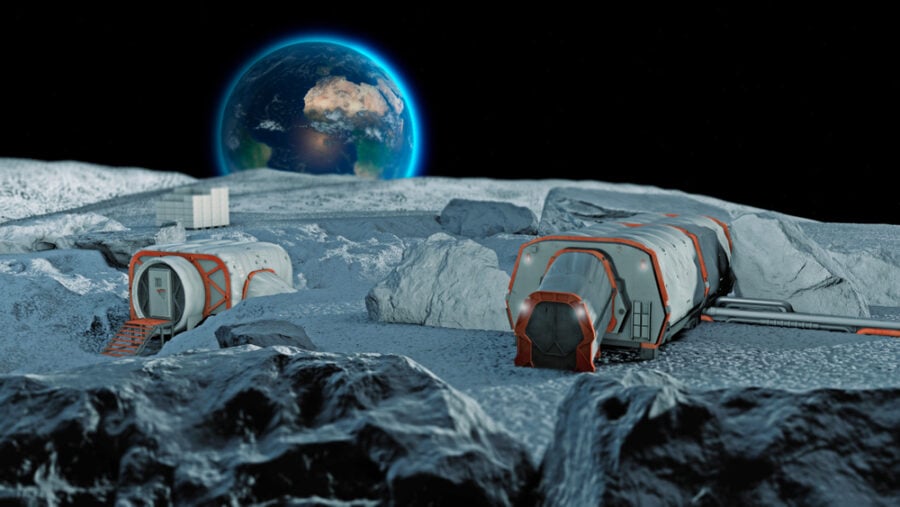Temperatures on the moon equators swing between -290 F and +240 F. Not quite the soothing picture romanticized by humans since the beginning of time. Lunar rocks’ mass to earth is a mere 1.2%, yet it is garnering so much weight in global conversations.
The fact is man is on a mission to colonize space, using our moon as a launching pad. Evidence of ancient Martian river deltas and water traces on the moon are some of the mysteries that await unfolding on these frontiers.
The US, China, Europe, and earth’s private billionaires are all vying for a piece of the action.
Those with the most space miles traveled could command not only the future of humanity in the galaxies but also become power brokers here on earth.
Space X
Elon Musk revealed a vision that spoke volumes about his intentions behind SpaceX. He speaks of an “extinction event” that will force humans to flee Earth. Musk’s aerospace company SpaceX is today a key partner to NASA, having designed, among others, landing systems that carry astronauts to and from the moon’s surface or even to orbiting space stations.
But, with suborbital flights, led by technology innovators on earth such as Jeff Bezos (Blue Origin) and Richard Branson (Virgin Galactic), already raking millions from would-be billionaire astronauts, the ambitions of the super-rich look suspiciously clear. They are more geared to creating a playground for earth’s wealthiest members, than endeavoring for scientific discoveries that could save earthlings, when doom rears its ugly face.
And now a piece of a SpaceX Falcon 9 rocket launched in 2015 is on course to crash into the Moon on Mar. 4, 2022. The size of the school bus, and weighing four tons, the debris is racing through space at 5,600 miles per hour. A silent but dangerous reminder of the damage man can and is leaving behind.
Return to the moon
Private-sector funding in space-related companies exceeded $10 billion last year, according to the McKinsey consultancy.
Some of that is coming from NASA, which is aiming to return to the Moon with humans on the moon’s surface by 2025, using its Artemis program. Since 1972, no human has stepped foot there.
NASA will land the first woman and first person of color on the Moon, and make use of new technologies to explore more of the lunar surface than previously done. The Artemis Base Camp will create a long-term presence there before sending the first astronauts to Mars.
NASA estimates The Artemis program will cost $86 billion by 2025.

UAE’s space program
The UAE launched the National Space Programme under which the UAE will prepare Emirati cadres specializing in airspace sciences. Launching the National Space Programme is part of the UAE’s ambitious space program of reaching Mars by 2021 and building the first settlement there by 2117. The program includes a museum and laboratories for conducting zero-gravity experiments. It will also include a ‘Living on Mars’ project, which is an initiative to design and print the best buildings suitable for the Red Planet using 3D printing technology.
February 9, 2022, marked one year since the UAE reached mars, only the fifth country in the world to do so. The Hope probe successfully entered the Martian orbit, despite 50% odds against it and has since sent back stunning images of the Red Planet.
Europe’s space ambitions
“We will be on the Moon and we believe we will be living there. We will use the Moon as an economic zone. This is a new frontier,” European Space Agency (ESA) director-general Josef Aschbacher recently told the 14th European Space Congress in Brussels.
Europe has no manned missions of its own and relied on the US and Russia to fly over 30 astronauts into orbit in past years.
The ESA’s 2021 space exploration budget stood at $822 million, just 7% of NASA’s.
China playing big
China’s goal is to become a “great space power,” as President Xi Jinping once said.
The country already placed a rover Mars, the second country ever to do so, and a probe on the far side of the moon, a first for any nation. China’s own space station is being built and nearing completion, while the International Space Station (ISS) approaches its end of service following over20 years orbiting Earth.
The aging structure will be allowed to crash into a remote part of the Pacific Ocean in 2031 saving NASA $1.3 billion in 2032.
China hopes to build a research station on the lunar surface.

Power struggle
Given all these countries’ high stakes and ambition in space exploration or even colonization, it brings to question control over the resources these nations are searching for there. Starting from the moon, large reserves of silicon, titanium, and other metals have been identified there.
Who owns the right to dig for these?
After water was discovered on the moon’s surface in 2008. Thales Group, a French multinational aerospace company, said: “Oxygen and hydrogen could be sourced from lunar ice to make rocket propellants, while other Moon resources like helium-3, an energy-producing isotope, could power future fusion rockets for the next step in the space race: sending people to Mars.”
With water being a key element to support lunar colonies, who can lay claim to what real estate to make them available to build on them?
Namrata Goswami, an expert on China’s space policy, once argued, “An advantage in accessing the vast wealth of the inner solar system could have an effect on the balance of power (on Earth).”
Already, a disagreement happened last year between China and the US over the so-called Artemis Accords, in which NASA looks to create rules around responsible and fair space exploration.
Will space become the new frontier for squabbles taking place between top nations here on earth?
One thing is for sure. There will be plenty of room for that in our vast galaxy.








